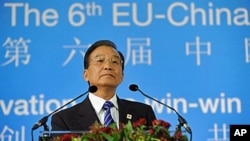China is defending its management of rare earths, saying it will control the export of the crucial elements, but will not use them as a political bargaining chip. Chinese Premier Wen Jiabao addressed his country's resource policy in the wake of a diplomatic dispute with Japan during which rare earths became a key pressure point.
In a speech to a business forum in Brussels this week, Mr. Wen dismissed suggestions that Beijing is reducing its shipments of rare earth elements for political reasons. He said China was acting to ensure that supplies do not run out.
"What we are pursuing is the sustainable development of rare earths, which is necessary to meet national needs -- and also the needs of the world," the state-run Xinhua news agency quoted Mr. Wen as saying during a speech he gave at the China-EU Business Summit in Brussels on Wednesday.
|
VOA's Kate Woodsome interviews Christine Parthemore, Center for a New American Security:
|
A rare earth monopoly
China supplies 95 percent of the world's rare earths exports, which have unique magnetic qualities used in computer hard-drives, hybrid cars, iPods, wind turbines and defense systems like laser missiles.
Fears that China might use rare earths as a political weapon arose last month during a dispute over Japan's arrest of a Chinese fishing captain near some disputed islands in the East China Sea.
Japanese traders said rare earth shipments from China had been halted, but China denied it had stopped exporting the elements.
Business diplomacy
Rare earths are becoming increasingly important in international diplomacy because there are no substitutes for the elements, says Christine Parthemore of the Center for New America in Washington, D.C.
"When tensions are tight between countries and when there's a really high demand for them within the exporting country, there are really clear political reasons to reduce exports or to withhold export shipments of these and to keep them for your domestic use," Parthemore says. "And what's driving China's actions, in part, is that their demand for these things is going through the roof as they move into producing and manufacturing wind turbines and solar panels and clean technology in their own country."
The United States was once the world's leading supplier of rare earths but the nation's only mine, located in California, closed in the 1980s. Dan Cordier, a rare earths specialist with the U.S. Geological Survey, says China edged in on the market when it realized rare earths were a byproduct of a major iron mine located in Inner Mongolia.
|
Kate Woodsome interviews US Geological Survey specialist, Dan Cordier:
|
Price wars
"They were able to low-ball on pricing for the rest of the world because they didn't need to make profit on the rare earths coming out of that mine, which were a byproduct," Cordier says. "And it sort of brought the rest of the rare earth industry and the world at the production level for making Rare Earth oxides virtually impractical to make money on."
That may be changing, according to Cordier. In July, China reduced the maximum amount of rare earths it could export by 72 percent, driving prices up.
"Where the invisible hand of economics comes in and free market works its way even into the realms of China, the overall expansion of that particular high technology of rare earths will succeed to invite competition and work for everybody's benefit," Cordier says.
Japan already is seeking options to end its dependency on China's exports, and is sending a delegation to Mongolia this month to investigate rare earth mining opportunities there. And the U.S. House of Representatives passed legislation last month supporting research into reviving the U.S. rare earths industry. Still, experts say that could take at least 15 years for the American effort to get up and running.
National security
Parthemore, of the Center of a New American Security, says that could be a concern for the United States, which relies on rare earths for its defense systems and burgeoning clean technology industry, both important to the national and economic security. She says the U.S. government is facing the added challenge of not fully knowing how much it relies on rare earths from China.
"With the privatization and globalization of the defense supply lines, this kind of information got out of hand and we didn't have a good grasp on it," Parthemore says. "It's a big problem, but it's one that Congress has ordered the Department of Defense to get on top of."
Parthemore says the Defense Department is expected to conduct a top to bottom review to determine how they actually use rare earths.




